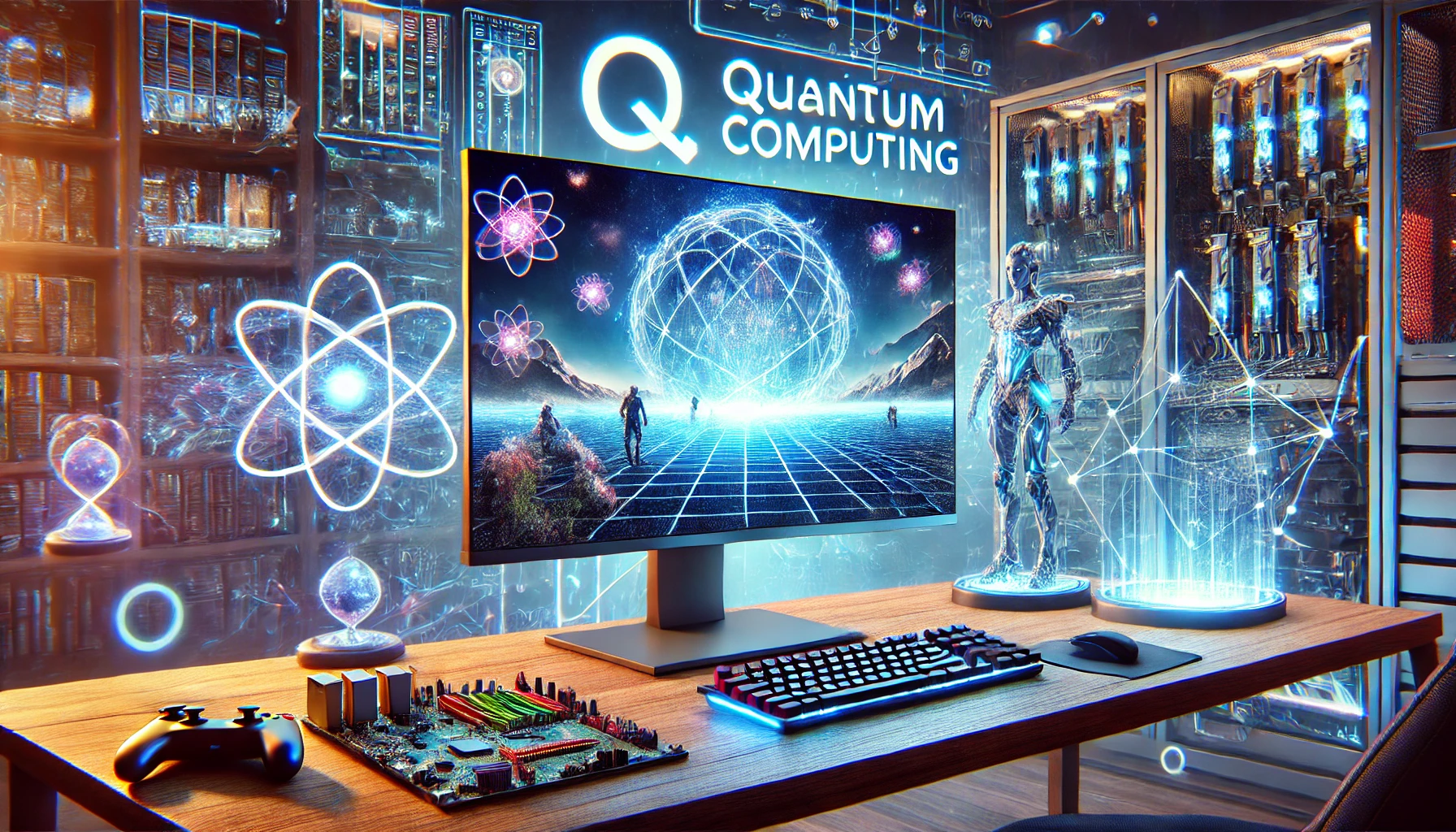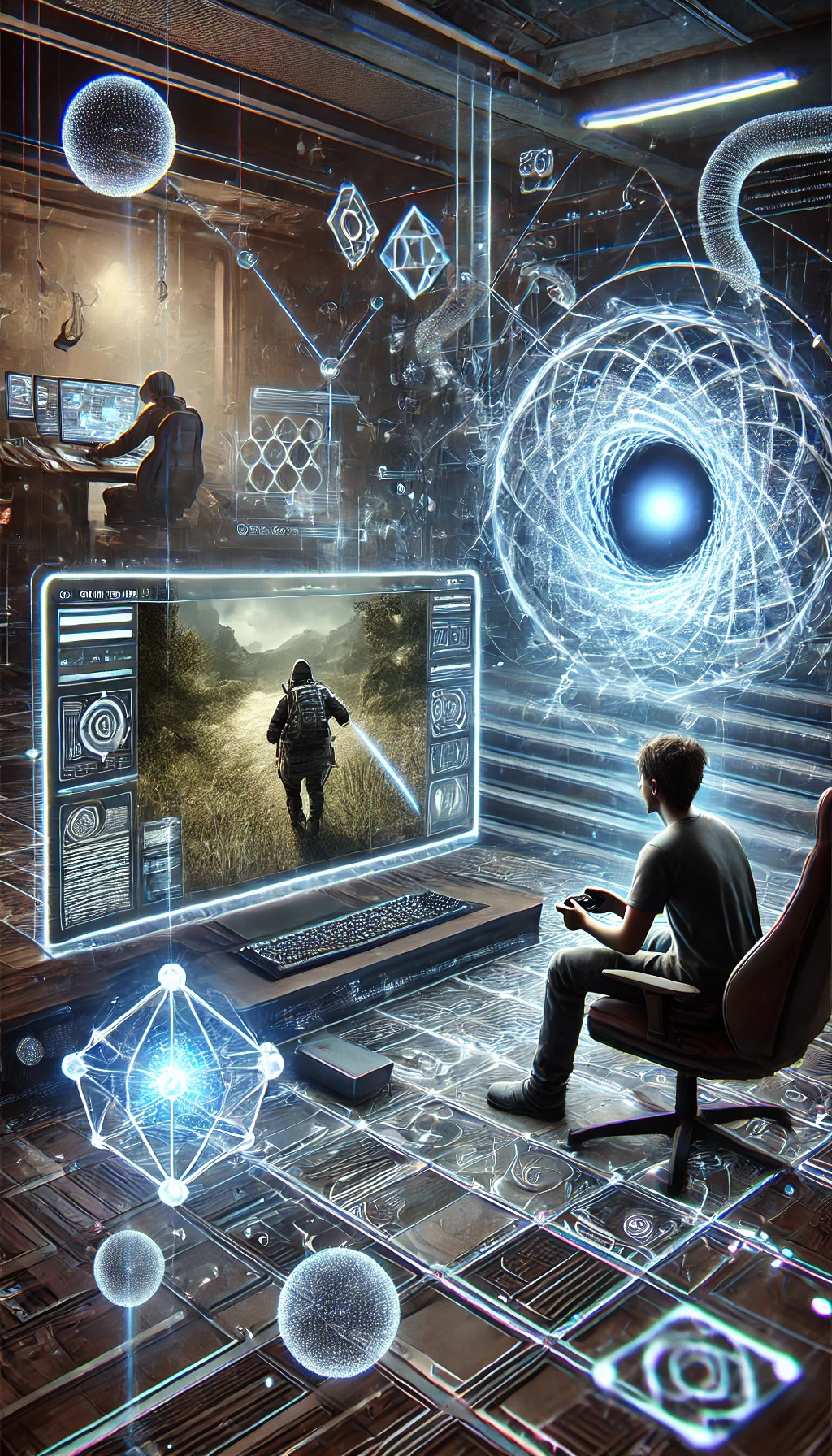
Quantum Computing in Gaming: Redefining Real-Time Rendering and Player Experiences
Published on: December 21, 2024
The gaming industry is no stranger to technological advancements. From the pixelated worlds of the 1980s to today’s sprawling, photorealistic landscapes, each leap forward has been propelled by innovations in hardware and software. However, as developers strive to craft ever more immersive experiences, they are increasingly limited by the constraints of classical computing. Quantum computing—a technology harnessing the principles of quantum mechanics—offers the potential to shatter these limitations, ushering in a new era of gaming.
In this extended exploration, we will delve into how quantum computing can redefine real-time rendering, physics simulations, AI, and procedural generation. We will also examine the challenges involved in integrating quantum technology into gaming and consider the ethical and practical implications of this seismic shift.
The Basics of Quantum Computing
To appreciate the transformative potential of quantum computing in gaming, it’s essential to understand the technology’s core principles. Unlike classical computers, which process data as binary bits (0s and 1s), quantum computers use qubits. Qubits can exist in multiple states simultaneously due to superposition, and they can influence one another instantly through entanglement.
These properties enable quantum computers to perform complex calculations at speeds unattainable by even the most advanced classical supercomputers. Tasks that require analyzing massive datasets, solving optimization problems, or running probabilistic simulations are particularly well-suited to quantum systems.
For gaming, quantum computing promises groundbreaking advancements in:
- Real-time rendering
- Physics simulations
- Adaptive AI and machine learning
- Procedural content generation
- Enhanced multiplayer experiences
- Data-driven game personalization
Real-Time Rendering: A Quantum Leap in Graphics
Modern gaming visuals are more lifelike than ever, thanks to techniques like ray tracing, which simulates the way light interacts with objects in real-world environments. However, achieving high-quality real-time rendering remains computationally expensive, often requiring developers to compromise between visual fidelity and performance.
The Current State of Rendering
Even with powerful GPUs like NVIDIA’s RTX series, real-time ray tracing often struggles to deliver smooth performance at high resolutions. Techniques such as upscaling and denoising help mitigate these issues but are far from perfect. Additionally, rendering in virtual reality (VR) and augmented reality (AR) applications demands even greater computational resources to avoid motion sickness and ensure seamless user experiences.
Quantum Rendering in Action
Quantum computers have the potential to revolutionize real-time rendering by tackling the immense number of calculations required for ray tracing. With quantum algorithms, light interactions across complex environments could be simulated with unparalleled speed and accuracy. Imagine a game where every shadow, reflection, and particle behaves as it would in the real world, all while maintaining ultra-high frame rates.
Beyond ray tracing, quantum computing could enable entirely new visual effects that are currently infeasible. For example, dynamic environments with realistic light scattering, volumetric effects, and real-time global illumination could become standard features in gaming.
Advanced Physics Simulations
Realistic physics is integral to creating immersive gaming experiences. Whether it’s a collapsing building, flowing water, or a character’s interaction with their environment, accurate simulations elevate the believability of virtual worlds.
The Problem with Classical Physics Engines
Physics engines like Havok and NVIDIA’s PhysX rely on approximations to manage computational loads. While these systems produce visually convincing results, they often sacrifice accuracy. For example, fluid simulations may lack detail, and destructible environments are often pre-programmed rather than dynamically generated.
Quantum-Enhanced Physics
Quantum computing can model complex physical systems with astonishing precision. By leveraging quantum simulations, developers could create worlds where every raindrop, flame, or shard of glass behaves according to the laws of physics.
In open-world games, quantum-powered physics could drive ecosystem interactions. For instance, weather systems could dynamically affect terrain and vegetation, while animal behavior adapts to environmental changes in real-time. Players would experience worlds that feel alive and reactive on an unprecedented scale.
Additionally, quantum computing could enable more accurate simulations of fluid dynamics, making water, smoke, and fire effects indistinguishable from reality. These advancements could redefine genres such as survival games, first-person shooters, and racing simulations.
Adaptive AI: Intelligent, Dynamic NPCs
Non-player characters (NPCs) and AI-driven systems are fundamental to modern gaming. From enemy tactics to procedural narratives, AI enriches gameplay by creating believable, responsive worlds. However, classical AI has its limitations.
Current Limitations of Game AI
Most game AI operates on predefined rules or machine learning models trained on static datasets. This can lead to predictable behavior and limited adaptability. While machine learning has introduced some dynamism, AI systems often struggle to respond effectively to unique or unexpected player actions.
The Quantum AI Revolution
Quantum computing could empower game AI to analyze and adapt in real time. Quantum-enhanced machine learning algorithms would allow NPCs to:
- Understand complex player behavior: Quantum systems could process vast amounts of player data to predict strategies and respond intelligently.
- Evolve dynamically: NPCs could learn from player interactions and adapt their behavior over time, making each encounter unique.
- Drive procedural narratives: By simulating countless narrative possibilities, quantum AI could generate branching storylines that react to player choices.
- Enhance multiplayer matchmaking: Quantum algorithms could optimize matchmaking by analyzing multiple factors, including skill levels, playstyles, and connection quality.
For players, this means smarter enemies, more engaging allies, and worlds that feel truly alive.
Procedural Content Generation
Procedural generation has transformed how developers create expansive game worlds. Titles like No Man’s Sky and Minecraft showcase its potential, but the complexity of procedural systems remains constrained by classical computation.
Quantum-Driven Procedural Generation
Quantum computing could take procedural content to new heights. By leveraging quantum algorithms, developers could:
- Generate infinite, diverse worlds: Quantum systems could create environments with unparalleled variety and detail.
- Personalize experiences: Games could adapt world generation to individual players, tailoring environments, challenges, and rewards based on playstyles.
- Simulate dynamic ecosystems: Quantum simulations could power ecosystems where every plant, animal, and weather pattern interacts realistically.
- Create multi-layered narratives: Quantum algorithms could generate storylines that evolve based on both player actions and the game’s internal logic.
Enhanced Multiplayer Experiences
Multiplayer gaming often hinges on balancing competition and collaboration. Quantum computing could improve matchmaking, optimize server performance, and reduce latency in online games.
Quantum Matchmaking and Networking
Quantum systems excel at optimization, making them ideal for improving multiplayer experiences. Matchmaking algorithms could analyze numerous variables—including skill, location, and playstyle—to create balanced teams. Additionally, quantum networking technologies could reduce latency and ensure seamless gameplay, even in massively multiplayer environments.
Challenges in Quantum Integration
Despite its potential, quantum computing faces significant hurdles before it can revolutionize gaming.
Hardware and Accessibility
Quantum computers are expensive and require specialized environments to operate. While cloud-based quantum computing services are emerging, widespread adoption will depend on advancements in affordability and accessibility.
Algorithm Development
Developers must create entirely new algorithms to harness quantum capabilities. This will require collaboration between quantum physicists, computer scientists, and game designers.
Compatibility
Most gaming infrastructure is built on classical systems. Hybrid architectures—combining classical and quantum computing—will likely be needed to bridge the gap.
Ethical and Environmental Considerations
As with any groundbreaking technology, quantum computing raises ethical and environmental concerns.
- Energy Consumption: Quantum computers require significant energy. Developers must prioritize sustainable practices.
- Data Privacy: The ability to process vast amounts of player data necessitates stringent privacy safeguards.
- Accessibility: Efforts must be made to ensure quantum gaming doesn’t widen the gap between affluent and less-privileged players.
Looking to the Future
Quantum computing is poised to transform the gaming industry in ways we are only beginning to imagine. From hyper-realistic visuals to dynamic, adaptive worlds, its potential is limitless. While challenges remain, the promise of quantum-powered gaming offers a glimpse into an exciting, immersive future.
For developers and players alike, the quantum frontier represents not just a technological leap, but a reimagining of what gaming can be. As quantum computing continues to evolve, the line between virtual and reality will blur, opening doors to experiences previously thought impossible.
